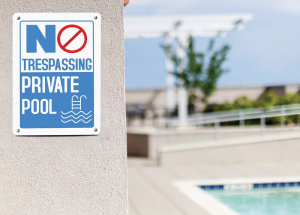
*Asked & Answered
Asked: “To what extent may our HOA be held liable for an injury sustained by a trespasser in our community pool?”
Answered: Under California law, a property owner, including a homeowners association (HOA) may have limited liability for injuries sustained by trespassers on the premises, such as at a community swimming pool. Historically, the general rule was that property owners owed no duty to trespassers other than to refrain from willful or wanton conduct. However, California Civil Code § 1714 now governs liability under general negligence principles, requiring that all property owners exercise ordinary care in the management of their property, regardless of the injured party’s legal status—be they trespasser, licensee, or invitee. The degree of care required is influenced by the foreseeability of harm and the likelihood of trespassers being present.
That said, significant legal limitations protect landowners from liability under specific conditions. Civil Code § 846 provides immunity for injuries sustained during the recreational use of private land—including swimming—unless the landowner (or HOA) willfully or maliciously fails to guard or warn against a known dangerous condition or expressly invites the injured party onto the premises. In the case of swimming pools, courts have consistently found that bodies of water are not “attractive nuisances,” meaning there is generally no heightened duty of care for children who trespass and are injured, such as by drowning. This doctrine was affirmed in multiple cases including Demmer v. Eureka and Knight v. Kaiser Co., where courts emphasized that the risks associated with swimming pools are considered open and obvious.
Nonetheless, liability could still arise in specific scenarios, particularly if the HOA fails to comply with applicable safety ordinances. For instance, in Grant v. Hipsher, the court found property owners liable after a child drowned in an unfenced pool, holding that compliance with mandatory safety fencing laws was a non-delegable duty. Similarly, failure to post required signage or maintain safety features (e.g., self-latching gates, life-saving equipment) could expose the HOA to negligence claims, even if the injured party was trespassing.
| While the legal framework generally limits a homeowners association’s responsibility for injuries to trespassers at the pool, liability is not entirely precluded. It is essential that the HOA’s Board ensures full compliance with all relevant state and local pool safety regulations. The presence of adequate fencing, secured access, posted warning signs, and regular maintenance are critical steps in mitigating potential liability. HOA legal counsel should be consulted to confirm current compliance with applicable statutes and ordinances. |
 HOA Lawyer Blog
HOA Lawyer Blog

